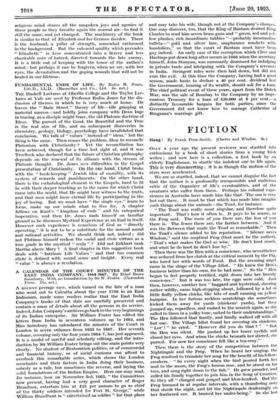A CALENDAR OF THE COURT MINUTES OF THE EAST INDIA
COMPANY, 1664-1667. By Ethel Bruce Sainsbury. With an Introduction by Sir W. Foster. (Clarendon Press. 21s. net.)
A RECENT peerage case, which turned on the fate of a man who went out to Calcutta about the year 1790 in an East Indiaman, made some readers realize that the East India Company's books of that date are carefully preserved and contain a mass of details about all the persons in its service. Indeed, John Company's archives go back to the very beginning of its Indian enterprise. Sir William Foster has edited the letters from India in seventeen volumes up to 1664, and Miss Sainsbury has calendared the minutes of the Court in London in seven volumes from. 1635 to 1667. Her seventh volume, covering only the four years 1664-7, has just appeared. It is a model of careful and scholarly editing, and the intro- duction by Sir William Foster brings out the main points very clearly. No student of Restoration politics, or of commercial and financial history, or of social customs can afford to overlook this remarkable series, which shows the London merchants and their factors in India doing their business, soberly as a rule, but sometimes the reverse, and laying the solid foundations of the Indian Empire. Here one may read, for instance, how on November 3rd, 1665, " the Committees now present, having had a very good character of Roger
Broadnox, entertain him at £25 per annum to go as chief of the thirty soldiers intended for Fort St. George," while
IV-AliaM- Broadbent is- " entertained us soldier" for that place
and may take his wife, though not at the Company's charges. One may discover, too, that the King of Bantam desired King Charles to send him seven brass guns and " green, red and yel- low plushes, rich incardinate tabbies "—probably incarnadine taffeta—" gold and silver lace, snaphaunce muskets with bandoliers," so that the court of Bantam must have been gay indeed. An early case of the corruption which Clive and Hastings put down long after occurs in 1666 when the secretary himself, John Stanyan, was summarily dismissed for indulging in private trade and intriguing with the Company's servants in India. Stringent rules were then laid down, but did not cure the evil. At this time the Company, having had a good season, made haste to declare a 40 per cent. dividend lest the Government, hearing of its wealth, should ask for a loan. The chief political event of these years, apart from the Dutch War, was the sale of Bombay to the Company by an impe- cunious Treasury for a loan of £50,000 at 6 per cent.—a distinctly favourable bargain for both parties, since the Government did not know how to manage Catherine of Braganza's marriage gift.










































 Previous page
Previous page